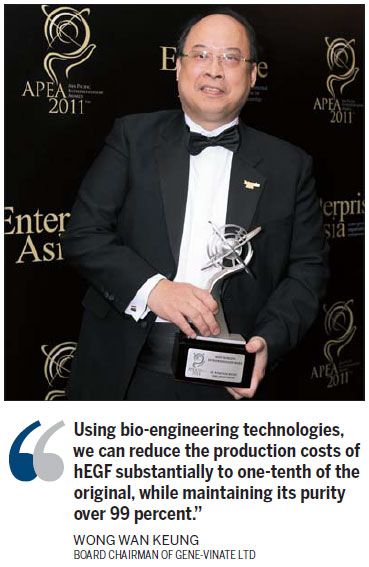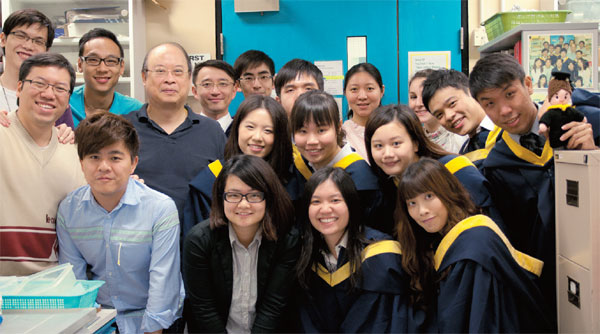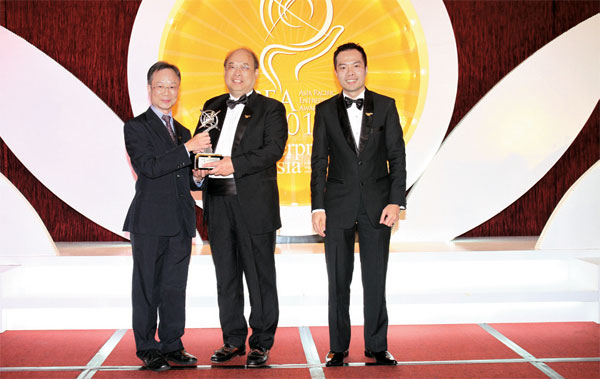Entrepreneur Special: Spreading fruits of science
Updated: 2014-02-09 08:39
By Zhuan Ti(China Daily)
|
|||||||
CEO brings skin treatment within reach of consumers
As both a scientist and entrepreneur in Hong Kong, Wong Wan Keung said his dearest wish is that "all the people in the world can enjoy the fruits of biological technology".
The board chairman of biotech company Gene-vinate Ltd is an expert in the emerging field. He and his team are devoted to biotechnological R&D and commercialization to promote healthcare and beauty.
|
Wong and his R&D team. Most of them are HKUST postgraduates. |
|
Wong Wan Keung (middle) wins the promising entrepreneurship award in the Asia-Pacific region in 2011. |
The company, also known as GVN, has sharpened an edge in making human basic fibroblast growth factor, a pharmaceutical protein known as hbFGF that can rejuvenate the skin, at a competitive cost.
Staggeringly high prices hinder the widespread use of hbFGF. The price of 1 milligram of hbFGF was more than 20,000 yuan ($3,304) before Wong discovered new production methods.
The key to the patented methods is using genetic engineering to turn a common strain of bacterium into an incubator for this magic protein.
GVN also uses the approach to make another type of protein - human epidermal growth factor. The substance hEGF is abundant in babies and can prompt skin growth. Yet as people age, less hEGF is produced, which prolongs the skin rejuvenation cycle. As a result, skin becomes wrinkled and sagging.
"Using bio-engineering technologies, we can reduce the production costs of hEGF substantially to one-tenth of the original, while maintaining its purity over 99 percent," he said. "The approach will help to popularize hEGF use."
The GVN beauty products aimed at the middle-aged inject hEGF into skin and accelerate the growth of surface skin cells.
Wong found that the hEGF is also valuable in medical use. It helps recovery in such case of diabetic foot ulcers, bedsores, surgical wounds, mouth ulcers, scalds and psoriasis.
Due to its high performance in promoting beauty and health, the GVN series have won the trust of consumers. Since the company was founded, more than 10 kinds of biotechnical beauty products GVN developed have rolled out from lab to market, earning it millions of HK dollars in revenue.
"To maintain a robust growth momentum, a company needs to master proprietary technologies over its product portfolio," Wong said.
Wong's successes in business are the culmination of a lifetime pursuit of science.
The entrepreneur showed an inquiring mind from a young age. A few months after he was born in Guangzhou, Guangdong province, he moved to Hong Kong with his family and received a local education.
During his pursuit of a doctorate degree in microbiology at the University of British Columbia in Canada in the 1980s, he showed a remarkable R&D capacity, which helped him earn his PhD within three and a half years as well as a job at Allelix biopharmaceuticals Inc after graduation.
While he was working at the well-known Canadian biotechnological company, he used bio-engineering methods to degrade such materials as waste paper and wood trim to glucose, which can be converted into alcohol by a process of fermentation as bio-energy to replace petroleum products.
The research has broad prospects and received wide attention in the industry. Wong published his findings on Science monthly journal and earned the company an international patent.
Despite his achievements abroad, he quit his job in Canada and began working as a research professor at the HK University of Science and Technology at the invitation of the school in 1990.
Recalling the significant change in his career, he said the decision was made out of the consideration that microbiology called for establishment and development at the new school then.
"I desired to return to take a part in the rewarding, groundbreaking work," he said, adding that another reason that drew him back was that he could share his research in the microbiology field with his students.
When he was teaching in Hong Kong, he thought of starting a business. In his eyes, biotechnology is not merely a theory in a lab but should bring benefits to society. "For me, the ultimate goal of conducting biotechnological research is to contribute to the society."
"We want to industrialize our research as soon as possible," he said. Now the majority of the company's R&D team is composed of HKUST postgraduates.
Commenting on the difference in the two roles of scientist and entrepreneur, Wong said scientists focus more on academic achievement while publication of academic papers is not followed that the projects can be industrialized.
In comparison, entrepreneurs value cost efficiency and development prospects higher, yet invest less in research.
"We choose a research project that will bring in economic benefits," he said. "Being a scholar-type entrepreneur, you need to know how to choose a research topic."
Besides the choice of rewarding research projects, securing investment is also key to tech startups.
As finance and the real estate are pillar sectors of the HK economy, funds lack interest in investing in tech companies, not to mention a longer period that biotech investment generally needs for a return.
"Even overseas, the survival rate of startup biotech companies is low because the investment is huge, the R&D cycle long and the outcome uncertain, with the downside risk of burning away all the investment dollars," Wong said.
"We are lucky to have received a $2 million research grant from the Hong Kong Government Industry Department and also strong support from Bio-Click Technologies, China Nansha Technology Enterprises Ltd and the HKUST R&D Corporation as the incubator."
The local biotech company has won popular acclaim in the industry. It was granted the honor for its outstanding tech contribution to the HK industry and commerce in 2008.
As biotechnology is designated as a national strategic emerging industry for the 12th Five-Year Plan (2011-15), GVN is now on a fast track. It has a joint venture on the Chinese mainland and has invested in building a good manufacturing practice center in Guangzhou.
Wong said "GVN will continue to root itself in Hong Kong and I hope that our products can be sold in various countries."
zhuanti@chinadaily.com.cn

(China Daily 02/09/2014 page7)

